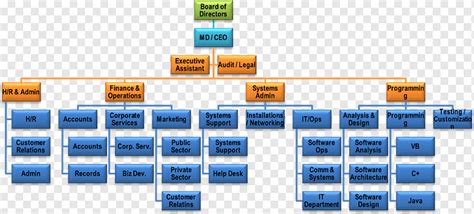The structure of a tech company is crucial for its success and growth. A well-defined organizational structure helps to establish clear roles, responsibilities, and communication channels, enabling the company to operate efficiently and effectively. In this article, we will explore the 7 essential components of a tech company structure that are vital for its success.
Understanding the Importance of Company Structure
A company's structure is the backbone of its operations, providing a framework for decision-making, resource allocation, and performance evaluation. In the tech industry, where innovation and adaptability are key, a flexible yet robust structure is essential for driving growth and competitiveness. A well-designed structure helps to:
- Clarify roles and responsibilities
- Enhance communication and collaboration
- Foster innovation and creativity
- Improve decision-making and problem-solving
- Increase efficiency and productivity
- Support scalability and growth
1. Leadership and Management
Effective leadership and management are critical components of a tech company's structure. The leadership team should comprise experienced professionals with a deep understanding of the industry, market trends, and the company's vision and mission. Key roles include:
- CEO (Chief Executive Officer): Provides overall strategic direction and vision
- CTO (Chief Technology Officer): Oversees technology development and innovation
- CMO (Chief Marketing Officer): Develops and executes marketing strategies
- CFO (Chief Financial Officer): Manages financial planning, budgeting, and investor relations

2. Product Development and Engineering
The product development and engineering team is responsible for designing, developing, and testing the company's products or services. This team should comprise skilled professionals with expertise in software development, engineering, and quality assurance. Key roles include:
- Product Manager: Defines product requirements and specifications
- Software Engineer: Designs, develops, and tests software applications
- Quality Assurance Engineer: Ensures product quality and reliability
3. Sales and Marketing
The sales and marketing team is responsible for promoting and selling the company's products or services. This team should comprise professionals with expertise in sales, marketing, and customer engagement. Key roles include:
- Sales Manager: Develops and executes sales strategies
- Marketing Manager: Develops and executes marketing campaigns
- Customer Success Manager: Ensures customer satisfaction and retention

4. Customer Support and Success
The customer support and success team is responsible for ensuring customer satisfaction and retention. This team should comprise professionals with expertise in customer support, account management, and customer success. Key roles include:
- Customer Support Manager: Develops and executes customer support strategies
- Account Manager: Manages customer relationships and accounts
- Customer Success Manager: Ensures customer satisfaction and retention
5. Finance and Accounting
The finance and accounting team is responsible for managing the company's financial planning, budgeting, and accounting. This team should comprise professionals with expertise in finance, accounting, and investor relations. Key roles include:
- Financial Controller: Manages financial planning and budgeting
- Accountant: Prepares and analyzes financial statements
- Investor Relations Manager: Manages investor relations and communications

6. Human Resources and Operations
The human resources and operations team is responsible for managing the company's personnel, benefits, and operations. This team should comprise professionals with expertise in human resources, recruitment, and operations management. Key roles include:
- HR Manager: Develops and executes HR strategies and policies
- Recruitment Manager: Manages recruitment and talent acquisition
- Operations Manager: Manages company operations and logistics
7. Research and Development
The research and development team is responsible for driving innovation and R&D efforts within the company. This team should comprise professionals with expertise in research, development, and innovation. Key roles include:
- Research Manager: Develops and executes research strategies and projects
- Development Manager: Manages product development and testing
- Innovation Manager: Identifies and develops new business opportunities and partnerships

In conclusion, the structure of a tech company is a critical component of its success and growth. By understanding the essential components of a tech company structure, organizations can establish a strong foundation for innovation, scalability, and competitiveness.






What is the importance of company structure in a tech company?
+A well-defined company structure is essential for a tech company's success and growth. It provides a framework for decision-making, resource allocation, and performance evaluation, enabling the company to operate efficiently and effectively.
What are the key components of a tech company's leadership team?
+The key components of a tech company's leadership team include the CEO, CTO, CMO, and CFO. These professionals provide overall strategic direction, technology development, marketing, and financial management.
What is the role of the product development and engineering team in a tech company?
+The product development and engineering team is responsible for designing, developing, and testing the company's products or services. This team should comprise skilled professionals with expertise in software development, engineering, and quality assurance.
